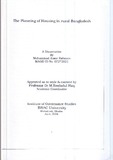| dc.contributor.advisor | Haq, Dr. M. Emdadul | |
| dc.contributor.author | Rahman, Mohammad Ataur | |
| dc.date.accessioned | 2010-10-20T10:50:39Z | |
| dc.date.available | 2010-10-20T10:50:39Z | |
| dc.date.copyright | 2008 | |
| dc.date.issued | 2008-06 | |
| dc.identifier.other | ID 07272021 | |
| dc.identifier.uri | http://hdl.handle.net/10361/607 | |
| dc.description | This thesis is submitted in partial fulfillment of the requirements for the degree of Masters of Arts in Governance and Development, 2008. | |
| dc.description | Cataloged from PDF version of thesis. | |
| dc.description | Includes bibliographical references (page 58- 62). | |
| dc.description.abstract | Being an agro based deltaic country, Bangladesh is one of the most land-scarce countries in the world. Though the National Land Utilization Policy has emphasized `family based land ceiling for rural housing' and rural model house building, but there is virtually no land-use plan for the rural areas that comprises about 85%0 of the total land area. The present facilities in respect of physical infrastructure, housing, water supply, sanitation, etc., are very inadequate. Housing shortage in the country in 1991 was estimated to be 3.1 million units, out of which 2.15 million units were in the rural areas (Housing Census 1991, BBS). Unplanned rural housing is a major problem area in our national life. Although the government has implemented a few sporadic rural housing projects viz. cluster/ ideal village projects etc. in the rural areas; those are very meager as compared to the needs of the vast majority of rural people. On the other hand, the Grameen Bank and few NGOs are providing loans for rural house building that has opened a new area in the field of rural housing of Bangladesh. Nevertheless, they are only able to serve a limited number of the rural population. Formulation of a proper institutional and legal framework for actively participating in rural housing, which has been included in the National Housing Policy, is still not being implemented.
The study is conducted to analyze the present housing condition and pattern in rural Bangladesh and to identify the trend of shrinking cultivable land through horizontal expansion of housing. The investigation also covers the importance of the land zoning system to overcome the challenge of decent housing as well as food security for the booming population. The study argues that for proper land utilization the government could introduce a land management act with a land zoning system and a ceiling for housing in rural Bangladesh, as well as strengthen the housing facilities for disadvantaged people in a planned way. The study tries to find alternative ways of rural housing like Compact Township (CT)/ Community Housing with basic infrastructural facilities and utmost utilization of land. | en_US |
| dc.description.statementofresponsibility | Mohammad Ataur Rahman | |
| dc.format.extent | 71 pages | |
| dc.language.iso | en | en_US |
| dc.publisher | BRAC University | en_US |
| dc.rights | BRAC University thesis reports are protected by copyright. They may be viewed from this source for any purpose, but reproduction or distribution in any format is prohibited without written permission. | |
| dc.subject | Governance and development | |
| dc.title | The planning of housing in rural Bangladesh | en_US |
| dc.type | Thesis | en_US |
| dc.contributor.department | Institute of Governance Studies, BRAC University | |
| dc.description.degree | M. Governance and Development | |

